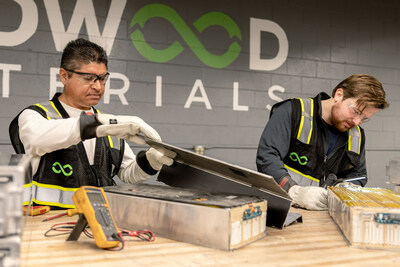Toyota and Redwood Materials Agree to Battery Recycling, Materials Procurement
- Expands on previous recycling agreement to create end-of-life pathways for Toyota batteries used in hybrid and battery electric vehicles
- Plans include agreement for Toyota to source Cathode Active Material (CAM) and Anode copper foil from Redwood's recycling activities for its supply chain
- Creates North American circularity by recycling and reintroducing recovered metals back into battery supply chain
"Working with Redwood Materials, we are creating a circular supply chain to optimize logistics, expand refining, and ensure that the valuable metals recovered can be reintroduced into our future vehicles," said Christopher Yang, Group Vice President, Business Development, Toyota Motor North America. "Accelerating our recycling efforts and domestic component procurement gets us closer to our ultimate goal of creating a closed-loop battery ecosystem that will become increasingly important as we add more vehicles with batteries to roads across
"Today, in collaboration with Redwood Materials, Toyota is making a decisive move toward a sustainable future," stated Cal Lankton, Redwood Materials' Chief Commercial Officer. "They're not only working to ensure responsible end-of-life management for their electric vehicles but also planning to build their next generation of EVs, in part, by using sustainable and domestically manufactured battery components."
Toyota's automotive battery recycling needs are expected to grow substantially in the coming years as more of its electrified vehicles, such as first-generation Prius models introduced more than 20 years ago, reach the end of their lifecycle. With a large amount of Toyota's retiring fleet of electrified vehicles being in
Toyota has agreed to develop a closed-loop framework that also includes plans to procure Cathode Active Material (CAM) and copper foil from Redwood as part of a long-term agreement. Based on the parameters of the agreement, Cathode Active material recovered and produced from Redwood's recycling activities are expected to feed recycled material into future new battery production at Toyota Battery Manufacturing,
"Toyota Battery Manufacturing North Carolina's start of production is right around the corner, and we're thrilled to be procuring critical battery components and materials to filter into our battery ecosystem," said Sean Suggs, TBMNC President. "We'll continue to work toward the sourcing and recycling of battery materials here in
Redwood is making major investments to scale their technology and facilities to supply
About Toyota
Toyota (NYSE:TM) has been a part of the cultural fabric in
Toyota directly employs more than 63,000 people in
For more information about Toyota, visit www.ToyotaNewsroom.com.
For Toyota customer inquiries, please call 800-331-4331.
About Redwood Materials
Redwood Materials is creating a circular supply chain to drive down the environmental footprint and cost of lithium-ion batteries and the electric vehicles and sustainable energy storage systems they power. Founded by JB Straubel, the
Media Contacts:
Toyota Motor North America
Josh Burns
Joshua.Burns@Toyota.com
Redwood Materials
Alexis Georgeson
press@redwoodmaterials.com
![]() View original content to download multimedia:https://www.prnewswire.com/news-releases/toyota-and-redwood-materials-agree-to-battery-recycling-materials-procurement-301990302.html
View original content to download multimedia:https://www.prnewswire.com/news-releases/toyota-and-redwood-materials-agree-to-battery-recycling-materials-procurement-301990302.html
SOURCE Toyota Motor North America










